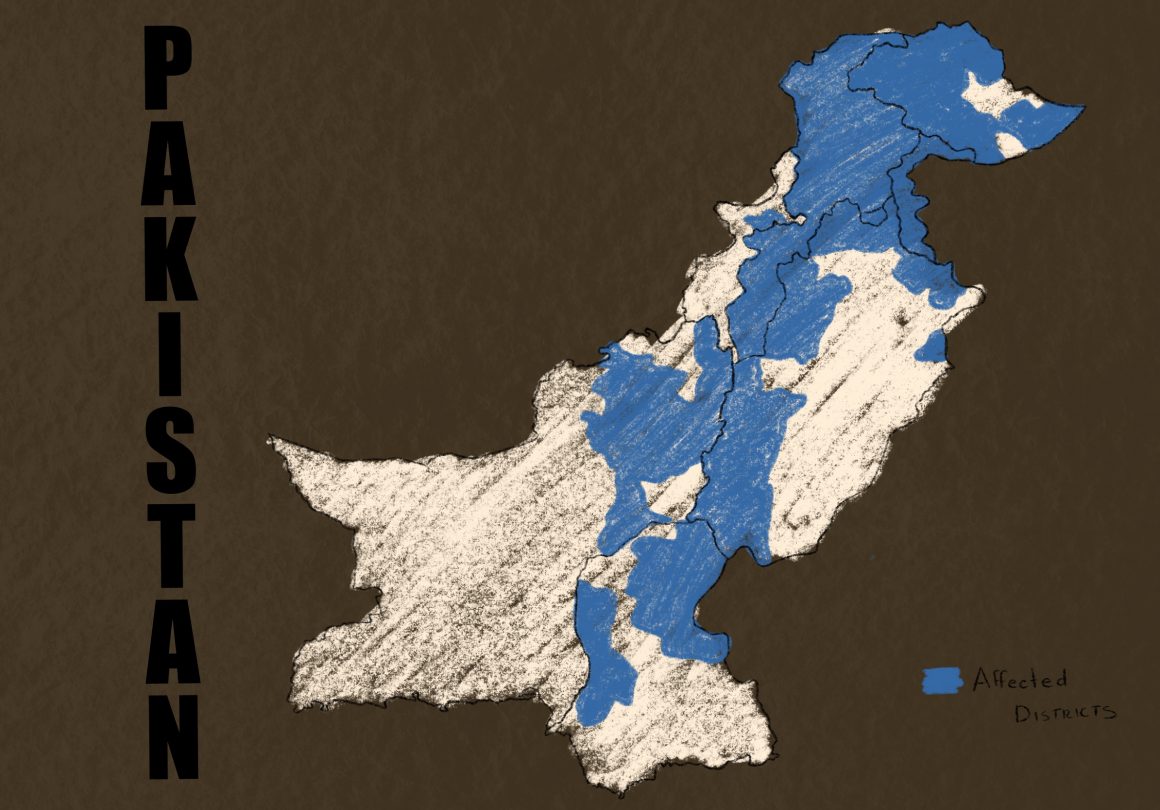
U of C Islamic Relief club fundraise to help Pakistan flood crisis
By Ayesha Shozib, October 12 2022—
When the expected monsoon rains began in Pakistan this June, there was no expectation of what it would quickly spiral into — the deadliest series of floods in the country’s history. The previous three months have seen the Punjab, Sindh, Balochistan and Khyber Pakhtunkhwa provinces being completely devastated by the water damage. By mid-June, about three million Pakistani civilians were affected, with an estimate of over 1,000 dead by the end of August. By September, the number of those affected had reached closer to 30 million. The economy has been all but washed away, millions of dollars lost in infrastructure, leaving a large population homeless.
National media within Pakistan has continued its efforts to cover every update that comes their way, all news channels in the country are drastically trying to spread information to the public so that they may hear some good news but, so far, no such news has come. In times like these, it would be expected that international media outlets would be covering the impact of the floods as well, but this has not been the case.
While the people of Pakistan struggle to find shelter, there has been little to no media coverage overseas. Nearby nations such as Turkey and the United Arab Emrites, however, have been providing aid by sending in food, while the United Nations has provided an amount of $160 million to help those affected by the floods. Western focus, on the other hand, has been towards the grandeur of the late Queen Elizabeth II’s funeral and celebrity gossip. The United Kingdom, the United States, Canada, and most of Europe have been fixated on matters that seem miniscule when compared to the damage and suffering of the people of Pakistan and, yet, we have seen none of this displayed to the public.
Most Western media has ignored the devastating floods and the information they do tend to give out is either outdated or simply does not emphasize just how dire the circumstances are. This is mainly because the news articles that are covering the story are not pushed forward like others. The stories fade into the background before they have the chance to cover any ground.
Groups such as Islamic Relief, that are based in Canada, have been working hard to do their due diligence, but their grassroots efforts have yet to be acknowledged by broader Canadian society.
“The floods in Pakistan like any other natural disaster have been heartbreaking to witness. The millions displaced and the thousands of lives lost were a devastating presage of how climate change is impacting our planet, specifically third-world countries,” said Urwa Ishtiaq, a representative of Islamic Relief. “They are not and will never be a temporary issue — hundreds of air-borne and water-borne diseases are and will continue to arise as well as further strain the already underfunded healthcare system in Pakistan following political unrest and a global pandemic.
“Islamic Relief Canada is on the grounds in Pakistan currently working on providing emergency relief to the millions displaced and will remain to help, even once the cameras have left,” she continued.
The major media groups in the west have a habit of including Pakistan — along with other Muslim majority countries — in major news coverage but only when it promotes the narrative of the “oppressive” and “terrorist-mongering” nation. Oftentimes, reporting is focused on mostly negative events, but including Pakistan in the news during a crisis such as this current one is important. Not only does it raise awareness and allows more aid to come in, but it creates a different narrative, one that shows the humanity within the nation that has been plastered as the image of Islamophobia and racism.
The misrepresentation translates not only into the news but also leads to desensitization when it comes to navigating tragedies like this when confronted with them, because of how they routinely represent the people often as terrorists or “backward” and “ambiguous” individuals. The reality is that the majority of the Pakistani community here is kind, hardworking, and do what they can to uplift each other in Calgary as well as overseas.
“As students, working on campus with Islamic Relief, we decided to begin fundraising via an outdoor community movie night to continue supporting Pakistan through such a cataclysmic time — [we] aim to bring the Pakistani community together and also support the greater cause,” said Ishtiaq. “The entire Islamic Relief UCalgary executive team is made up of immigrants who acknowledge the privileges we possess and believe in giving back to the communities that we left before arriving in Canada, including Pakistan.”
Time and time again we have seen how people in North America and Europe respond to nations with more care or concern when those who are suffering look like them, rather than when a Middle Eastern or South Asian nation endures the same. The floods in Pakistan are only the most recent ongoing tragedy on a long list of events that have gained no attention by those outside the region.
As time goes on, these issues only become more severe, the ignorance shown by those who have an influential power that goes beyond borders needs to be amended. If North American and European countries continue to sweep countries like Pakistan under the rug, deeming their crisis’ as not newsworthy, the ones to face the brunt of the devastation will be innocent men, women, and children unable to find a way out.
This article is a part of our Voices section.
